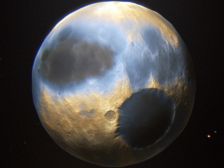| Online: | |
| Visits: | |
| Stories: |

| Story Views | |
| Now: | |
| Last Hour: | |
| Last 24 Hours: | |
| Total: | |
A science fiction writer explains what UFOs are?
Sunday, June 14, 2015 14:45
% of readers think this story is Fact. Add your two cents.
The June 22nd, 2015 issue of National Review has a piece on Pluto, the demi-planet: To a Planet Unknown by John J. Miller [Page 20 ff.].
From the article:
Clyde Tombaugh discovered Pluto in 1930 … H.P. Lovecraft … was drafting a story called “The Whisperers in Darkness,” a blend of horror and science-fiction that involves … the dark planet Yuggoth, the rim of the solar system … Lovecraft was striving to improve the story, and he hit upon the idea of making Yuggoth a stand-in for Pluto.
New Horizons, the NASA probe launched in 2006 [is] scheduled to reach Pluto on July 14th [2015].
As we learn what Pluto is … we also learn what it’s not, such as the “fabricated metal ball” that Clifford D. Simak imagined in his 1973 short story “Construction Shack.”
[And] As Larry Nixon wrote in “Wait It Out,” a 1968 story about a troubled mission to Pluto: “A new world would hold infinite surprises.”
E.E. Doc Smith, a founding father of the “space-opera” genre of science fiction, described Pluto in his 1950 novel First Lensman as the home of an alien colony that has not yet noticed Earth.
Robert A. Heinlein made Pluto a prison for unruly earthlings in his 1958 young-adult novel Have Space Suit – Will Travel.
In 1984 Kim Stanley Robinson published Icehenge. Its title refers to an enigmatic, megalithic structure, similar to Stonehenge, at Pluto’s north pole. “It had the look of mind markings cosmos, like the paintings on a cave wall … But what as it doing on Pluto?
Pluto’s moon Charon … It’s so large compared with Pluto that the two bodies form a binary system: They revolve around each other, orbiting a point in space.
Last year … astronomers announced the existence of 2012 VP113 – a tiny planetoid well beyond the orbit of Pluto.
Lovecraft clearly defined Yuggoth as Pluto … Then he mentioned an overlooked line from a fevered passage in “The Haunter in the Dark,” the last story Lovecraft ever wrote: “I remember Yuggoth, and more distant Shaggai, and the ultimate void of the black planets.”
Yes, this is all about Pluto but I draw an inference that Sci-Fi writers seem to have unconscious insights or insightful gifts from the gods that give than access to truths that we “normals” do not have.
Therefore, it seems that there might be an explanatory fiction somewhere in the science fiction genre of literature wherein one of the gifted provides, at least, a tertiary solution to the UFO phenomenon.
Shouldn’t we be looking for that?
RR
http://ufocon.blogspot.com – The UFO Iconoclast(s)
Source: http://ufocon.blogspot.com/2015/06/a-science-fiction-writer-explains-what.html




